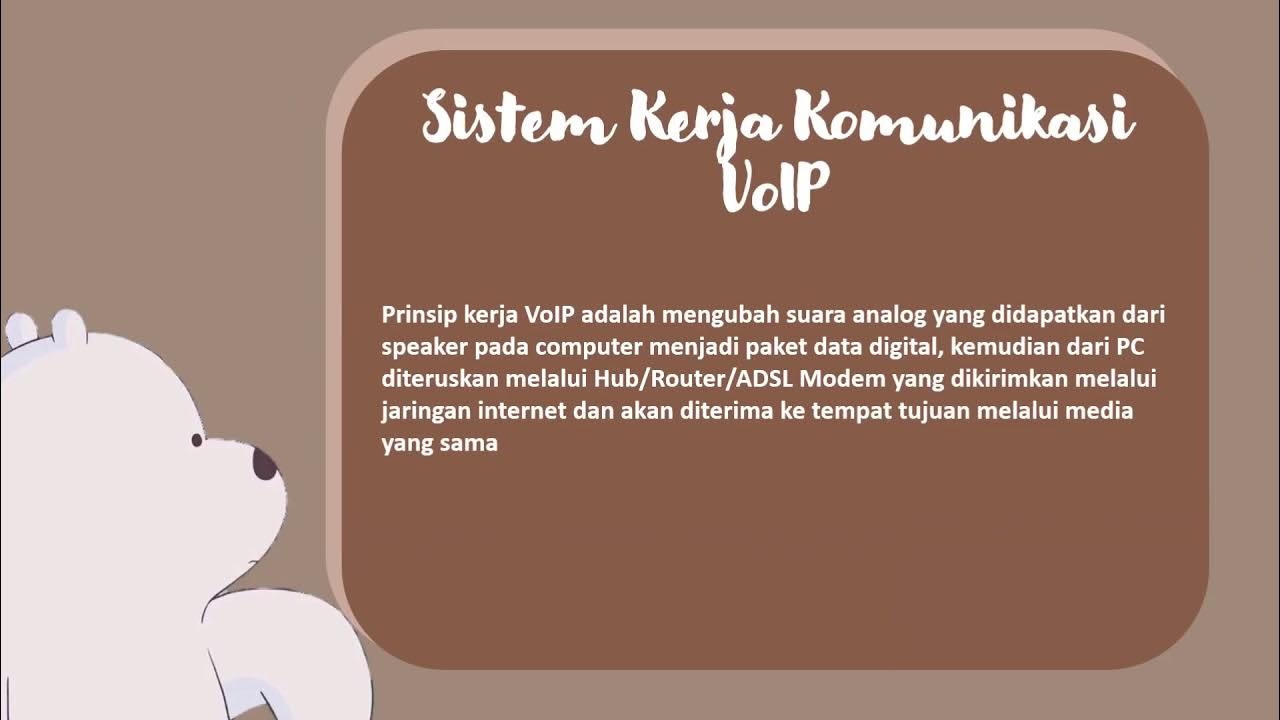What is VoIP?
Summary
TLDRThis video explores Voice over Internet Protocol (VoIP), a technology that enables phone calls over the internet instead of traditional landlines. It outlines the essentials needed to use VoIP, including a service provider, internet connection, and equipment. The video explains how VoIP works through protocols like SIP and RTP, highlighting its benefits such as cost savings, convenience, and advanced features. However, it also addresses potential drawbacks, including power dependency and the need for a stable internet connection. Overall, VoIP represents a modern solution for efficient communication in both personal and professional settings.
Takeaways
- 📞 VoIP stands for Voice over Internet Protocol, allowing phone calls to be made over the internet instead of traditional telephone lines.
- 💡 The primary goal of VoIP is to meet modern business needs for flexible, cost-effective, and convenient communication.
- 🔌 To use VoIP, you need a VoIP service provider, a stable internet connection, a router or switch, and a VoIP phone or softphone application.
- 📱 A VoIP phone connects via an RJ45 port and uses an internet connection, whereas a traditional phone connects through an RJ11 phone line.
- 🚀 Calls are initiated using the Session Initiation Protocol (SIP), which maps phone numbers to IP addresses for connection.
- 🎤 Your voice is converted from an analog signal to a digital signal using an Analog to Digital Converter (ADC) for transmission.
- 📦 Data packets carrying your voice travel over the internet using the Real-time Transfer Protocol (RTP), enabling audio and video communication.
- 💰 VoIP offers significant cost savings, especially for long-distance and international calls, compared to traditional phone services.
- ✨ Advanced features of VoIP include conference calling, call recording, voicemail, and virtual PBX options, enhancing user experience.
- ⚡ VoIP services are dependent on power and a stable internet connection, making them vulnerable during outages or connectivity issues.
Q & A
What does VoIP stand for?
-VoIP stands for Voice over Internet Protocol, which is a technology that enables phone calls to be made over an internet connection instead of traditional telephone lines.
Why was VoIP developed?
-VoIP was developed to meet the modern business needs for a more flexible, inexpensive, and convenient way to make phone calls.
What are the key components required to use VoIP?
-To use VoIP, you need a VoIP service provider, a reliable internet connection, a router or switch, and either a VoIP phone or a softphone application.
How does VoIP differ from traditional landline calls?
-Unlike traditional landline calls that use PSTN (Public Switched Telephone Network), VoIP utilizes a standard broadband internet connection to facilitate phone calls.
What is the role of SIP in VoIP?
-SIP, or Session Initiation Protocol, is responsible for establishing a VoIP call by mapping phone numbers to IP addresses, similar to how DNS maps domain names to IP addresses.
What technology converts voice into digital signals in VoIP?
-In VoIP, an Analog to Digital Converter (ADC) converts your voice from an analog signal into a digital signal for transmission.
What are some of the benefits of using VoIP?
-Benefits of VoIP include convenience, cost savings on long-distance calls, advanced features like call recording and analytics, and flexibility for users to make calls from anywhere with an internet connection.
What are some disadvantages of VoIP?
-Disadvantages of VoIP include reliance on power and internet stability, potential issues with call quality during internet disruptions, and compatibility concerns with certain alarm or security systems.
What is a softphone?
-A softphone is an application that you can download and install on devices like computers, tablets, or smartphones, allowing you to make phone calls over the internet without needing a physical VoIP phone.
How does Aura protect personal information online?
-Aura helps protect personal information by removing it from the internet and alerting users if their credit file is compromised. It also offers features like antivirus protection, password management, and a VPN for secure browsing.
Outlines

This section is available to paid users only. Please upgrade to access this part.
Upgrade NowMindmap

This section is available to paid users only. Please upgrade to access this part.
Upgrade NowKeywords

This section is available to paid users only. Please upgrade to access this part.
Upgrade NowHighlights

This section is available to paid users only. Please upgrade to access this part.
Upgrade NowTranscripts

This section is available to paid users only. Please upgrade to access this part.
Upgrade Now5.0 / 5 (0 votes)





